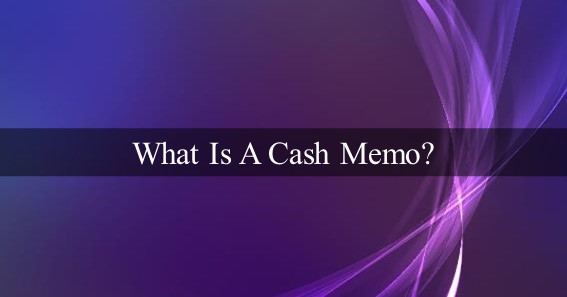Are you curious to know what is a cash memo? You have come to the right place as I am going to tell you everything about a cash memo in a very simple explanation. Without further discussion let’s begin to know what is a cash memo?
In the world of commerce and business, documentation plays a crucial role in maintaining transparency and ensuring smooth transactions. Among the various documents used, a cash memo holds particular significance. A cash memo, also known as a cash receipt or sales receipt, is a written proof of a cash transaction between a buyer and a seller. In this blog post, we will explore what a cash memo is, its purpose, and why it is an essential document in business transactions.
What Is A Cash Memo?
A cash memo is a written document issued by a seller to a buyer after a cash transaction takes place. It serves as evidence of the purchase, detailing the items bought, their quantities, prices, and the total amount paid. The cash memo typically includes information such as the seller’s name and address, the buyer’s name, the transaction date, and any applicable taxes or discounts.
Purpose And Significance:
- Proof of Purchase: A cash memo serves as a legal and official proof of purchase. It provides evidence that the buyer has paid for the goods or services and establishes the transaction’s authenticity. It is essential for both the buyer and the seller to have a record of the transaction to refer to in case of any disputes or for accounting purposes.
- Consumer Rights Protection: Cash memos play a vital role in protecting consumer rights. They serve as a warranty or guarantee document, enabling consumers to seek redress or replacements for faulty or defective products. In case of any discrepancies or issues with the purchased items, the cash memo acts as evidence of the transaction and helps resolve consumer complaints.
- Accounting and Bookkeeping: Cash memos are integral to maintaining accurate financial records. They provide essential information for accounting and bookkeeping purposes, allowing businesses to track sales, inventory, and revenue. The details mentioned on the cash memo help in calculating taxes, analyzing sales trends, and preparing financial statements.
- Returns and Exchanges: In the event that a buyer wishes to return or exchange a product, a cash memo becomes essential. It serves as proof of the original purchase and aids in ensuring that the return or exchange process is smooth and hassle-free.
- Tax Compliance: Cash memos play a critical role in tax compliance for both buyers and sellers. They provide evidence of sales transactions, helping businesses report accurate sales figures and calculate taxes owed. Buyers can also use cash memos as supporting documents for claiming tax deductions or reimbursements.
Best Practices For Cash Memos:
To ensure the effectiveness and validity of cash memos, the following best practices are recommended:
- Sequential Numbering: Cash memos should be issued with unique and sequential numbers to maintain a systematic record of transactions.
- Clear and Complete Information: Cash memos should contain clear and complete details of the transaction, including the date, seller’s information, buyer’s information, item descriptions, quantities, prices, taxes, and discounts (if applicable).
- Retention and Storage: Both buyers and sellers should retain copies of cash memos for a reasonable period. This ensures that records are available for reference, auditing, and warranty claims.
- Digitalization: With the advent of technology, businesses are increasingly opting for digital cash memos or e-receipts. Digital records offer convenience, reduce paper wastage, and facilitate efficient record-keeping.
Conclusion:
In the world of business transactions, a cash memo holds significant value. It serves as a tangible proof of purchase, protects consumer rights, aids in accounting and taxation compliance, and facilitates smooth returns and exchanges. By adhering to best practices and maintaining accurate cash memo records, businesses can ensure transparency, build trust with customers, and maintain proper financial documentation. For buyers, retaining cash memos safeguards their rights and simplifies post-purchase interactions. In essence, cash memos contribute to a fair and accountable business environment, benefiting both buyers and sellers alike.
FAQ
What Is The Meaning Of Cash Memo?
Cash Memo is one of the transaction records between buyer and seller, and the seller arranges for the sale of the money, and the same is given to the buyer when the goods are purchased. It is the documentary proof of all transactions made by the business, and is proof of the cash purchase of the consumer.
What Is Cash Memo Class 11th?
Explanation: A cash memo is the document which is issued to record the cash purchases of the business. It includes quantity, rate and total amount of goods sold, along with the date of transaction. It is issued by the seller of the goods. These cash memos are used to record the transactions in the books of accounts.
What Is The Example Of Cash Memo?
One of the regular customers, Jeni, visits the shop and buys two pairs of jeans of Levi’s brand for $100 each and 3 T-shirts of Nike brand for $50 each. Joe offers a 10% discount to Jeni and charges 10% VAT. It is an indirect tax levied on the product consumption. read more on the sale transaction.
What Is The Difference Between Invoice And Cash Memo?
An invoice is a document that indicates the amount owed for products sold or services done. A cash memo is an instrument that indicates a cash payment was made for the merchandise. An invoice is generated before a payment is made. A cash memo is generated after the payment is completed.
I Have Covered All The Following Queries And Topics In The Above Article
What Is A Cash Memo
What Is A Cash Memo
How does cash memo work
What is a cash memo?

